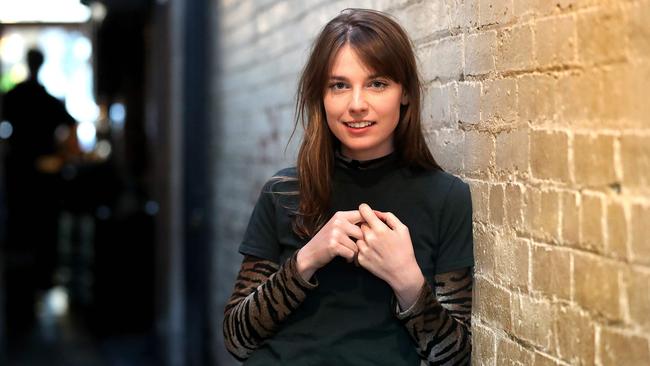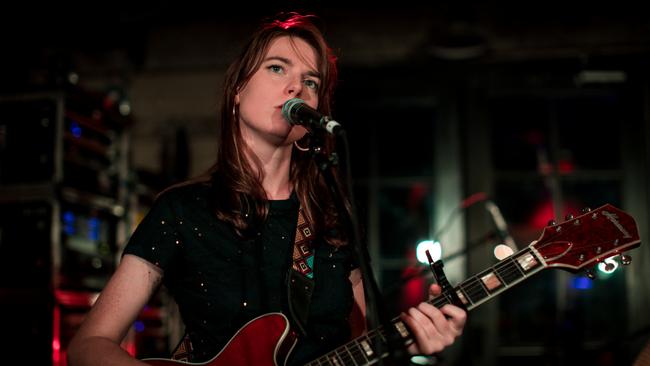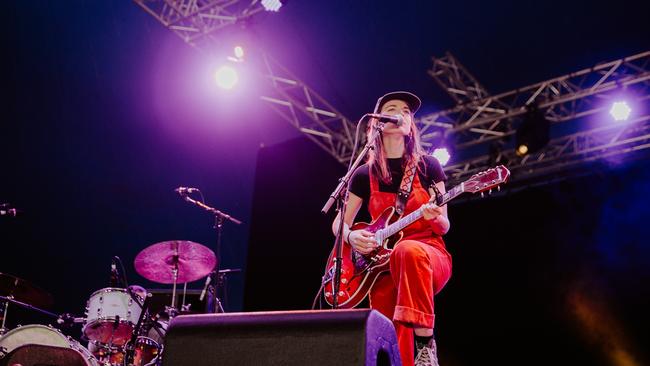Self help
Amid personal doubt and introspection, singer-songwriter Angie McMahon is finally able to stop and hear the rain.

The life of a singer-songwriter demands that the performer constantly put themselves first: it’s their name on the album cover, on the concert ticket, on the T-shirt. Depending on an artist’s predilection for uncertainty, this demand for self-centredness can be exhausting and tiresome, no matter how deeply they’re devoted to their craft.
For Melbourne musician Angie McMahon, it’s a subject she has been wrestling with for some time. Since the release of her debut single in late 2017, her smartly crafted indie rock arrangements — foregrounded by her distinctive, powerful voice — have found an audience both here and overseas, such that she has been shocked and thrilled to find people singing along to songs she first wrote purely with the intention of satisfying herself.
“I’ve had different levels of meltdowns about that over the last couple of years,” McMahon tells Review. “I spend so much time thinking about the job and all of this stuff that is just my name, basically; me performing under my name.
“I remember having this conversation with my dad, he works in human rights. I’m looking at myself and saying, ‘Dad, please, is my job really selfish?’
“But he’s a really big music fan and he loves books; our house is full of books, and all this art and literature that surrounds my life,” she says. “He told me, ‘No, you’re contributing to people relating to the world and relating to themselves through art and through music. You are making art, and people are always going to want art and music.’ ”
That wisdom was well received and timely, and ahead of the release of her debut album, McMahon continues to draw inspiration from the kind and generous way in which her father framed her career during that moment of personal crisis.
“It’s such a nice way to think about it, to be part of a narrative,” she says. “When I was younger I definitely didn’t understand it. If I think of my dream as an 11-year-old, to be standing on a stage, singing — it didn’t really involve anyone else. I just envisioned myself being able to sing. And now there’s so many other people involved in it. I see the narrative in everything, and it makes you feel smaller in the best way.
“You can work really hard at it without becoming too self-obsessed, and that’s what I’m trying to do: to write about myself, work on myself and process my experiences, without thinking that they’re the most important thing in the world,” she says. “But the idea that I’m contributing to other people understanding themselves, and I’m contributing to my understanding of the world, and hopefully other people’s understanding of the world — that’s a goal that makes sense to me.”

Early last year, McMahon and her band — drummer Lachlan O’Kane and bassist Alex O’Gorman, who also works as an engineer and producer — hired a scout hall in Harcourt, near the Victorian town of Castlemaine, to finish recording her debut album, Salt. One of her favourite moments during that week appears at the very end of the album, taking the form of something that’s not heard too often in the digital era: a hidden track. At the end of an acoustic song titled If You Call, the listener hears McMahon playing a guitar chord progression and singing a wordless melody as a single microphone inside the hall captures both her music and the sound of rain outside.
“I’d been thinking about each of these songs for so long and practising them for so long that maybe it felt a bit rebellious in terms of the structure of the record, or a desire to have something that was a bit improvised,” she says. “It was so liberating to perform like that and to not have to over-think it. I was just kind of f..king around, and I said to Alex, ‘If you’re recording, let’s keep it and use it as atmosphere for the record.’ It felt like a nice little thing to drop in.”
Impromptu decisions such as these can become fan favourites, as McMahon well knows. The first hidden track she can recall hearing appears at the end of Ed Sheeran’s 2011 album +, wherein a traditional Irish song follows a period of silence after Give Me Love. At first she was annoyed by its inclusion, but now she sees the appeal in an artist hiding Easter eggs such as this, as gifts for the devoted or the curious to stumble upon.
McMahon’s debut single, Slow Mover, reached No 33 in the Triple J Hottest 100 last year, and was nominated for both song of the year and rock work of the year at the APRA Music Awards in April. An autobiographical ode to putting energy into things that are worthwhile, and choosing to pursue a music career over young love, that track has also achieved ARIA gold accreditation and amassed 10 million Spotify plays. Is it validating to know that so many people enjoy hearing her art?
“It absolutely is, and it’s really exciting for me because it’s a job that I always wanted to do,” says the songwriter. “It’s my dream and it makes it viable to write more and release more. That’s what those [Spotify] numbers mean.
“Also, on a personal level I get to see it when we play live, that it does connect with people.

I get reminded of it every time we play a gig. We recently played in Germany, and Slow Mover was on a playlist that made it big, so people know the song over there. Having the song sung back to us in a completely different part of the world — that’s just mental. It shocks me every time that happens.
“It’s really nice to be a part of a music community,” she says. “I know all these other people’s songs and I sing other people’s songs at gigs, and I’m a fan of all of these bands. It’s cool to be also playing gigs where people react to your music. It’s validating, because it makes me feel like I belong in the job that I’m doing. There’s so much self-doubt involved in the work as well, and so much ‘I’m not good enough’, and mental health problems that come with it. To have that validation and belonging is such a gift, and it’s a really wonderful thing to focus on.”
Salt is released on Friday via AWAL Recordings. Angie McMahon’s tour begins in Melbourne (October 2) and ends in Hobart (October 19).




To join the conversation, please log in. Don't have an account? Register
Join the conversation, you are commenting as Logout